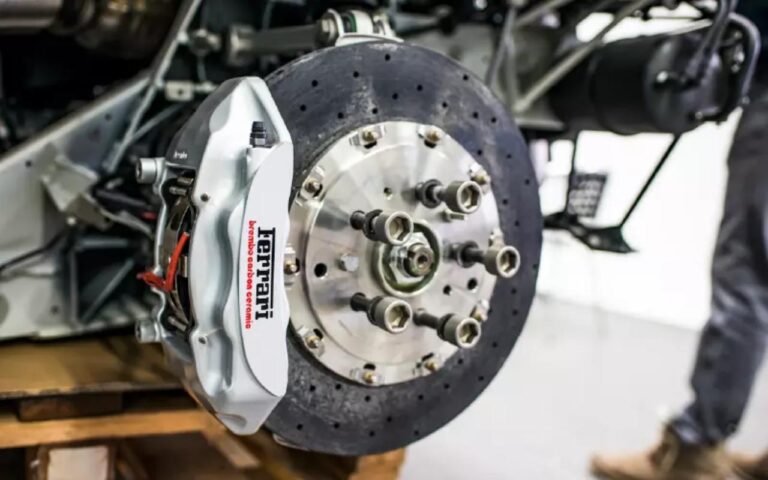Maintaining our vehicle can be a daunting task. Car maintenance goes beyond a simple washing activity using a pressure hose. One of the many parts to maintain is the brake system, but the wheels make the job difficult. Can you clean brakes without taking tires off?
If you talk about thorough cleaning of the brake system, the answer is you can’t. But if you talk about cleaning the rotor or the exterior part of the brake system, you certainly can. That is what you will learn from this article.
As you probably realize from doing your research, there are not that many articles (not a single article, I think) that talks about cleaning brakes entirely without removing the wheels. That is because you simply can’t.
Several components make up your car’s brake system, including the rotor, the brake pads, and the caliper assembly. If you want to clean all the parts of the brake system, you need to disassemble them.
Below are a couple of ways to clean the exterior part of your vehicle’s brake system.
How to Clean Brakes Using a Wheel Cleaner and a Pressure Hose
The auto care market nowadays is packed with products that help your maintenance job a lot easier. You can shop around your local auto shops and look for wheel cleaners that would help you clean off dust and rust on the outer portion of your car’s brake.
It involves a simple process, so I would call this “the lazy man’s way” to clean brakes. But I will still provide the step-by-step process below.
Step 1: Buy a wheel cleaner. There are a lot of brands you can choose from when buying this product. The best advice I could give you is to get a product that does not destroy the delicate finishes or paint on your wheels. PH-balanced solutions are less likely to destroy the paint on your wheels.
Step 2: Spray the cleaning solution on your brake rotor and caliper assembly and let it sit for 2 to 4 minutes. You will notice that the color of the area you spayed on the solution will change color.
Step 3: Wash the solution out using your pressure hose, and voila! Your brakes will look clean.
Here is a simple video that demonstrates how to do it.
Brake Cleaning: The Long Method
Not everybody owns a pressure hose, or not all the time a pressure hose is available when the idea of cleaning your brakes pops into your head. If you are wondering about an alternative way to clean your brakes, the steps below might help.
Materials and Equipment Needed
- A jack
- A pan
- Scrub brush
- Tire cleaner
- Rinse solution on spray bottle/pump sprayer
- Microfiber towel
Step 1: Jack up the car. Safely elevate the vehicle using your jack until the tire can spin. The purpose of lifting the car is to turn the tire while you do the cleaning process.
Step 2: Position the drain pan. Put the drain pan under the tire that you are cleaning. This pan is where all the liquids and the residue go. With this process, you don’t need a lot of rinsing – the pan should be enough.
Step 2: Apply the cleaning solution. Spray on the cleaning solution of your choice around the brake rotor and the caliper. As always, it is best to pick the solution that doesn’t hurt your wheel paint.
Step 3: Brush the dirt off. Using your scrub brush, brush away the dirt and dust on your brake’s rotor and caliper until you are confident that you have removed them completely. Rotate the tire as you do this to ensure that you have covered all areas. You may need another brush to reach the deep parts of the caliper.
Step 4: Spray the rinse solution. After having fun brushing off the dirt, spray on the rinse solution to rinse off the residue. If you think it did not do the job, you can use a pump sprayer to apply more pressure and drain the dirt down into the pan.
Step 5: Wipe off excess water. Grab your microfiber towel to wipe off the drops of water on your brake rotor and caliper. You might need to give the tire a little spin to ensure that any trapped water leaks out for the towel to absorb.
Step 6: Jack down. Lower down your vehicle, keep your jack, and get ready to roll.
The good thing about this method is that you can also clean the other parts of your wheel while cleaning your brakes. You can clean your wheel arches and tires using the same materials.
The video below may give you more details on how to do this method.
How Often Do You Clean Brakes
Whether we like it or not, dirt and dust stick around our brakes system, making it unpleasant to the eyes. The changing weather is the main factor that makes our brakes look dirty. Sometimes a typical wash will not handle the job of cleaning the brakes on our vehicles.
Over time, rust could also occur on the brake’s rotor, and it will make your brakes look ugly. So, the big question now is: How often should you clean your brakes?
Car shops usually advise you to at least clean up your brake system at least once a year. Others suggest that you clean your breaks when you reach between 5,000 to 7,000 mileage or every four to six months. Which is which?
In my honest opinion, once or twice a year is perfect. That is right if we are talking about overall cleaning that involves removing the wheels and thoroughly cleaning each brake system component.
However, if we talk about the part of the brake that we can see with our naked eyes or the outer portion of the brakes, I would say that we need to clean it as often as possible. Brakes can quickly get dirty. You drive in the rain or take a bit of rough road, and your brakes can quickly look ugly.
The best way to keep your breaks clean is to start from the outside. Whenever you see that your brakes are dirty, grab that pressure hose and fire it on your brakes. It could be as easy as that. The point is to keep them clean to avoid more significant issues.
When I wash my car, I always make sure that I do not take the brakes for granted. I always make it a point to check them and see if they need some serious cleaning.
I always have some cleaning solution in my trunk, so it is a matter of applying the lazy man’s technique by spraying the wheel cleaning solution on the brakes and washing it out with water using a pressure hose.
Also Read: Best Tires For Volvo XC90
How Much Does It Cost to Clean Brakes
Cleaning the exterior part of the brakes is something everybody can do. You can take an hour out from your Sunday afternoon and dedicate it to doing the job. Although, you can also get someone to do the job for you, of course, for a fee.
On the other hand, cleaning the whole brake system is a bit tedious, and I suggest that you allow the professionals to do it for you. The process is not easy because you need to dismount your wheels and disassemble your brake system completely.
Thus, letting a mechanic do the job for you could be your best option. After all, you only need to do this at least once or twice a year.
Now, back to the question. How much does it cost to clean your brakes? Approximately the charge per brake is around $80 to $120. So, for complete service, you should be ready with at least about $500. The quoted amount does not even include the add-ons like the brake fluid, brake pads, or any other components that might need replacement.
Yes, it is costly to clean those brakes. Of course, it is! Brakes are among the most critical parts of your vehicle. Your safety relies on the performance of your brakes, so maintaining them is part of your protection.
Conclusion
Cleaning the outer part of your brakes is easy. You could use wheel cleaning solutions coupled with a few steps, and you can complete the task. In saying so, you can do it as often as you wish.
However, complete maintenance cleaning of your brakes is not doable without removing your tires. The process involves disassembling your brake system, which you cannot do without taking your tires off.
In cleaning your brakes thoroughly (all the components), it is best to have a mechanic do it for you. The job is not very easy to perform and requires some expertise. It does hurt your pocket a little bit as you need to prepare at least $500 for a complete service, plus the add-on costs.
However, you don’t need to do it often. Once or twice a year should be enough for your brakes to continue to give you optimal performance.

